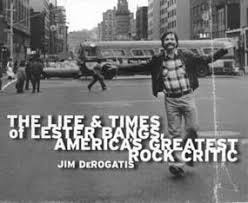Christgau, Bangs, rock's critical canon
How much did the Village Voice, Rolling Stone, Creem help rock?
One of them is still around, still cranking out a monthly set of reviews of records that, chances are, nobody you know has ever — or will ever — play. The other died of an overdose some 43 years ago at the end of this month — an event which surprised no one.
Together, Robert Christgau, 82, and Lester Bangs were two of the most significant literary voices — if that’s not too high falutin’ a categorization for rock critics — when rock and roll music stopped being just 45’s jammed in a juke box at some burger joint, but an important form of musical expression that somehow managed to change the world without really trying.


I read ‘em both; Christgau in the Village Voice, which I didn’t always see since I grew up in New Hampshire, Bangs in Creem Magazine, a wild, monthly rock and roll periodical that was as impudent and smart-assy as Jann Wenner’s Rolling Stone was reverential and reflective. Compared to Time or Newsweek, of course, Rolling Stone looked like an outlaw publication. But contrasted with the delightfully irreverent Creem, it was almost establishment. I subscribed to both, a considerable investment for a poor college kid.
For reasons that will never be completely clear to me, rock music hit me hard in those years. While I read a lot of literature, short stories in particular, I’m sure I spent twice as much time with The Beatles and The Beach Boys, then Bob Dylan, the Rolling Stones, The Who, Motown, Rod Stewart and many others. Reading Christgau and Bangs, along with others like Greil Marcus and Langdon Winner and Jon Landau, later, Bruce Springsteen’s manager!, gave me a sense of the musical scene through their ears in their words. It inspired me to think that someday I might do the same.
When you’d read Christgau review a Waylon Jennings’ album like this: “Waylon lets you know he has balls by singing as though someone is twisting them,” well, as a young writer, how could you not love that?
Some months ago, I recounted the story about me in the Rivier College Student Lounge, suffering over one woman playing the same godawful song over and over and over. I spoke up, she turned out to be the editor of the campus newspaper, “The Perspective” (which she could have used some) and she dared me to write a review for the paper. I reviewed Bob Dylan’s new album “Planet Waves” and haven’t stopped since.
Lester Bangs was a deeper dive, of course. There was no gray area with him and you had to be willing to go along for what would likely be a mind-bending ride.
Like this review of the Rolling Stones’ “Black & Blue” album from 1976. “There are two things to be said about this new Stones album before closing time: one is that they are still perfectly in tune with the times (a,k.a., sometimes, trendies) and the other is that the heat’s off, because it’s all over, they really don’t matter anymore or stand up for anything, which is certainly lucky for both of them and us: I mean, it was a heavy weight to carry for all concerned. This is the first meaningless Stones album and thank god. No rationalizations — they can now go out there and compete with Aerosmith, or more precisely, since just like the last two before it this album’s strongest moments are Jagger singing ballads, the “adult pop” market. Barry Manilow, even.
“I don’t even hate “Black & Blue” like the new Led Zep, which admittedly is unworthy of hatred from anybody except a true patriot who expected more than what you knew you were going to get — what you get here is sweet flow Muzak dentist office conversation piece bright eyes shining in the face of nothing at all which they will not even confront and more power to ‘em.”
The idealism, the worthy and necessary rebellion that Bangs found in some, preferably earlier rock and roll, was gone now, to him. He couldn’t hear it any longer. But until his death in 1982, he wrote some of the wildest, most daring bits of rock and roll writing you’d ever want to read. Critic Jim DeRogatis did a commendable bio of him, even got to interview him a couple weeks before he died.
In a collection of Bangs’ work called “Psychotic Reactions and Carburetor Dung,” he offers a standard review of Peter Guralnick’s wonderful “Lost Highway,” a superb collection of profiles of musicians, then writes an untamed “Notes On Lost Highway” where he imagines something unimaginable with the body of Elvis Presley that will shock and amuse and well, you’d have to read it…
Calling him outrageous is always an understatement. They more or less immortalized him in the film “Almost Famous” and REM name-dropped him in “It’s The End Of The World As We Know It.” He’s a trip, that’s for sure. For a young writer, learning how to write about these things, let’s just say whatever boundaries you might have thought there were, Lester Bangs just obliterated them.
Christgau’s work was far more tightly hewed to the ground and his Consumer Guide, a brief pithy paragraph or two about a record release, was always opinionated, snappily written and entertaining. Sometimes, he was dead-ass wrong.
Like his take on U2’s first album “Boy.” “Boy [Island, 1980] Their youth, their serious air, and their guitar sound are setting a small world on fire, and I fear the worst. No matter where they're starting off--not as big as Zep, maybe, but not exactly on the grunge circuit either--their echoey vocals already teeter on the edge (in-joke) of grandiosity, so how are they going to sound by the time they reach the Garden? What kind of Christian idealists lift their best riff from PIL (or from anywhere at all)? As bubble-headed as the teen-telos lyrics at best. As dumb as Uriah Heep at worst. C+”
As we know, U2 went on to become one of the most important and influential of all rock and roll bands, one of music’s all-time great outfits. Later, Christgau admitted that he was always wrong about them and their music.
But with Bruce Springsteen’s “Born In The USA,” his wildly successful 1984 album that was one of the biggest sellers of all-time (30 million sales!) he couldn’t have been more on the money.
“Bruce Springsteen: Born in the USA [Columbia, 1984] Imperceptible though the movement has been to many sensitive young people, Springsteen has evolved. In fact, this apparent retrenchment is his most rhythmically propulsive, vocally incisive, lyrically balanced, and commercially undeniable album. Even his compulsive studio habits work for him: the aural vibrancy of the thing reminds me like nothing in years that what teenagers loved about rock and roll wasn't that it was catchy or even vibrant but that it just plain sounded good. And while Nebraska's one-note vision may be more left-correct, my instincts (not to mention my leftism) tell me that this uptempo worldview is truer. Hardly ride-off-into-the-sunset stuff, at the same time it's low on nostalgia and beautiful losers. Not counting the title powerhouse, the best songs slip by at first because their tone is so lifelike: the fast-stepping "Working on the Highway," which turns out to be about a country road gang: "Darlington County," which pins down the futility of a macho spree without undercutting its exuberance; and "Glory Days," which finally acknowledges that among other things, getting old is a good joke. A+”
While I don’t imagine I could ever love music the way Christgau does — a check of his Consumer Guides will reveal pages and pages of bands, singers, African artists you’ve never heard of, looking back, it’s fair to say his obsessions helped me understand or maybe even find mine.
When I did my first “Bob Dylan: A Descriptive, Critical Discography” for McFarland way back when (I have three editions of it now), I modeled the book on Christgau’s Consumer Guide and am now embarked on a similar book on Neil Young’s work, due some time next year. (Wish me luck! He won’t stop recording!)
Though there’s so much more media accessible now than there ever used to be, you can find any song or artist you want on YouTube or Spotify or any of the other sound joints, finding those kind of reliable critics, those familiar, even contentious voices just ain’t so easy any more. There are plenty of opinions out there, there are a half-dozen YouTube videos ranking Neil Young albums alone. But critical voices like Lester Bangs and Robert Christgau, they’re long gone. Both helped me get here, wherever that is.
My only guide is my loyal Substack readers, who have almost always responded wonderfully to my music posts - 1,260 views on my “Exile On Main Street,” 1,444 on “Sgt Pepper,” over 10,600 on my Paul Westerberg post from January, 1,000 on Dylan’s live “Shelter From The Storm,” and there’s many more. So maybe the two of them taught me something after all. Thanks, guys…I’ve got more to write…
John Nogowski is the author of “Bob Dylan: A Descriptive, Critical Discography 1961-2022” now available on Amazon. His new baseball book, “Diamond Duels” is available locally at Barnes & Noble, Midtown Reader and Hearth & Soul. I’ll be doing a book signing at Books A Million on Saturday, April 26. Hope to see you there!




Robert Christgau is still cranking them out too.
And It Don't Stop
https://robertchristgau.substack.com/
The Village Voice was so fun to read at its height. Both these guys were so passionate about music. Nothing like great writing to make you invest your hard earned money on a record.
But really? I respect your right to claim these two as your favourites, John, but really?
Greil marcus is far and away the best of that generation's music critics, and he's still as sharp as a tack.
Of course, this is an entirely American view of rock music, so I get the focus on these two Americans. But over here in the UK, we had terrific writers, too, such as Charles Shaar Murray, Kris Needs, and Paul Morley, and I always found them more alive than most Americans, Lester Bangs and Greil Marcus, of course, excepted, when talking about pop music (for it is mere popular music, is it not?).
But, and I freely admit this, Christgau was right the first time about U2...ha-ha!
But hey, different strokes for different folks...this was still an enjoyable piece, John...thanks!